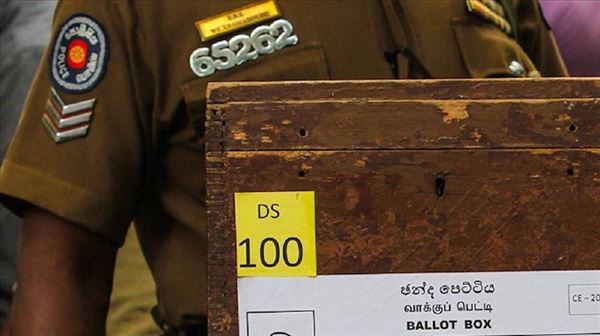Sri Lanka has tightened security across the South Asian island as nearly 16 million people will go to the polls on Saturday to elect a new President.
Sri Lanka has tightened security across the South Asian island as nearly 16 million people will go to the polls on Saturday to elect a new President.
Ruwan Gunasekara, a police spokesman, told Anadolu Agency that a total of 60,175 police personnel will be on duty on Saturday. “We are providing sufficient security by also dispatching over 3,000 mobile units, and also deploying an anti-riot squad,” he said.
The elections will be closely contested between ruling party candidate Sajith Premadasa, 52, and opposition candidate Gotabaya Rajapaksa, 70, the former defense secretary who played a key role in crushing the rebel Tamil tigers known as LTTE, in 2009.
Premadasa is the deputy leader of the ruling United National Party (UNP) and had to openly rebel against UNP leader and incumbent Prime Minister Ranil Wickremesinghe to secure the candidacy from the party.
A total of 12,845 polling centers have been set up across the country and two policemen would be deployed at each center as part of the security measures.
Election authorities have extended the voting period by an hour in this election, owing to the complexities of more than 26-inch long ballot paper which features a total of 35 candidates, the largest number of candidates in the country’s presidential election history.
Rizan Abdul Hameed, an Election Commission official, said the voting will start at 7.00 a.m. local time (0130GMT) and conclude at 5.00 p.m (1130GMT).
“It’s a long ballot paper, so there are complexities, which is why the voting time has been extended by an hour,” he told Anadolu Agency.
More than 150 foreign observers have already arrived in the country to monitor the elections.
“There are 80 European Union observers, as well as observers from Commonwealth Observer Group, Asian Network for Free Elections and several others. We have given them necessary accreditation, granting them access to all polling centers and counting centers,” Hameed said.
Prasad Welikumbura, a Colombo-based political activist, believes the next president of Sri Lanka should be someone who represents all nationalities, religions and communities living in the country.
During his election campaign, Rajapaksa appealed to the majority Buddhist population, claiming credit for defeating the LTTE. His party is promising to maintain Sinhala Buddhist character of Sri Lanka. His tenure as defense secretary of the country, having scant regard for human rights and dissent, is keeping most of minority groups away from him.
“It shouldn’t be someone who represent and caters only to the issues and needs of the majority but also the minorities,” Welikumbura told Anadolu Agency.
Welikumbura said that the new president should have the ability to help heal the wounds caused by the Easter attacks and the riots that followed the attacks.
“Having a developed country physically does not mean anything if we don’t build the political culture and restore humanity in this society,” he said.
Welikumbura added that it was also important to have an administration in place which allows people to exercise freedom of expression and question the government for their wrongdoings.
